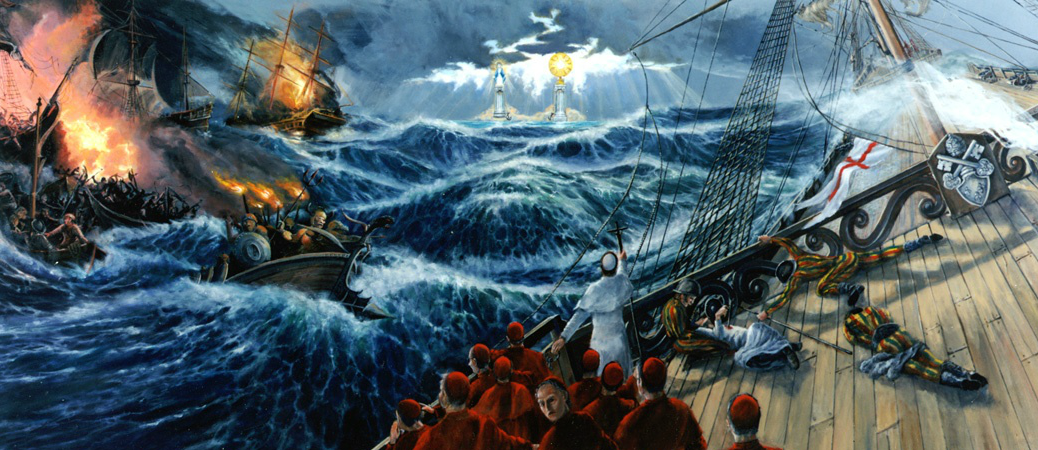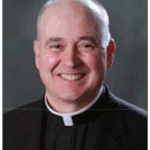In last Sunday’s Pastor’s note, I reprinted Fr. Lawrence Brey’s summary on the Catholic Church’s teaching regarding Private Revelations. In today’s space I want to present a 2010 essay entitled THE ERROR OF THE SEDEVACANTISTS by Fr. Thomas Carleton. The “Sedevacantism” he is talking about is a dissent coming from the right-wing of contemporary Catholic life, and it has disturbed the peace-of-mind of not a few traditional-minded Catholics. Sadly, some of our brethren who once worshipped alongside us at Holy Trinity Church and at Mary Immaculate of Lourdes have been taken in by this schismatic error and walk no more with us. Fr. Carleton’s essay is very clarifying:
“…They were distressed, and lying like sheep that have no shepherd.” (Matthew 9,36)
The case does not exist where an individual lamb decides whether or not the flock has a shepherd. A sheep, as Our Blessed Lord explains, recognizes the voice of the shepherd: “My sheep hear My voice: and I know them, and they follow Me.” (John 10,27). The individual sheep can only recognize the Shepherd’s voice and follow it; or, contrarily, not recognize it, follow a hireling, or be eaten by wolves. When an individual sheep fails to recognize the voice of the shepherd, it does not mean that he is not the shepherd, it only means that that sheep is not part of the flock: “You do not believe, because you are not part of My sheep.” (John 10,26)
The “sedevacantist” is one who maintains that the Church is without a pope. The proper use, however, of the term “sedevacante” (or “vacant seat”) refers to the period between the death of one pope and the election of his successor. The Church, though, is never without shepherds. The sedevacantist not only rejects the pope, but rejects as well the apostolic college, the successors of the apostles, who are the shepherds who have elected the pope, the supreme visible shepherd. Our Blessed Lord established His Church so that His flock would not be “like sheep that have no shepherd”. (Matthew 9,36)
The sedevacantist attempts to mask his estrangement from the Church in the manner of the Protestant theory of private Biblical interpretation, that is to say, by his own collection and interpretation of various texts (in his case, of former popes or councils), which, in turn, he then uses to pass judgment on the Vicar of Christ. The First Vatican Council has taught that a pope cannot be a heretic, which would itself be a direct attack on the infallible intercessory prayer of Christ: “I have prayed for thee,” Our Blessed Lord assures Peter, “that thy faith fail not.” (Luke 22,33) In sedevacantists, indeed, is verified the rebuke of the Lord: “You err, not knowing the Scriptures, nor the power of God.” (Matthew 22,29)
The pronouncements and formulae of the Church, moreover, are not, nor have they ever been, used to decide who is a shepherd: “The Lord hath sworn, and He will not repent. Thou art a priest forever according to the order of Melchisedech.” (Psalm 109,4) “All things therefore whatsoever they shall say to you, observe and do: but according to their works do ye not; for they say, and do not.” (Matthew 23,3)
When St. Paul speaks of the “house of God, which is the church of the living God, the pillar and ground of the truth” (I Timothy 3:15), he is not referring to a collection of past or present documents, he is referring to the teaching of the present successors of the Apostles in union with the Vicar of Christ, who would, no less than Peter, be guided by the Holy Spirit.
It is impossible for one to say that he rests upon the pillar and ground of truth, which is the Church, if he has not Peter. It is the “bark of Peter” that is an image of the true Church. Attacking the Captain of the ship forms part 0f that despised work of mutiny. Our Blessed Lord has given to the Church a visible Captain so that we can be sure whose boat we are in. When someone fails to recognize the visible pilot of the ship, it does not mean that he is not the true captain, it merely means that that person is not in the right boat, the only boat that has been assured of safely arriving into the harbour of heaven, the shores of eternity.
The sedevacantist errs in believing that the documents of the Church can be a “rule of faith” independent of a living shepherd, just as the Protestant (with actually even greater reason than the sedevacantist) believes that the Holy Scriptures themselves, privately interpreted, can be a rule of faith. It is for this reason that there is no “rule of faith”, nor is there any “magisterium”, apart from Peter, and that is to say, apart from living shepherds: “He that heareth you, heareth Me; and he that despiseth you, despiseth Me; and he that despiseth Me, despiseth Him that sent Me.” (Luke 10,16) The texts, documents, and formulae of the Church are considered only the proximate inanimate rule of faith. These must have the proximate animate rule of faith, which is the Church guided by living shepherds. Our Blessed Lord, in fact, did not say to His Apostles: Go write down what I have said; He said to them: “Going therefore, teach ye all nations.” (Matthew 28,19)
It is for a deep reason that Our Divine Lord tells us that we must follow, not the words (verba), as if written, but the voice (vox) of the shepherd. We have a living shepherd, not a dead shepherd. It is also important to note that
a lamb, much like an ever faithful dog, does not distinguish words as individual concepts, but merely the living sound or voice of his shepherd, and the name given him by that shepherd. In other words, it does not rest on the individual lamb to pass judgment, as such, on the truth content of a shepherd’s words; it rests, rather, upon the individual sheep to recognize who his shepherd is. The Good Shepherd could not have made it more simple than that for us poor sheep. The Good Shepherd assures His sheep that if they should stray away, He shall come after them (cf. Matthew 18,12-14); but He gives no such assurance to those who are not His sheep, those, that is, who do not recognize the voice of the shepherd.
Many sedevacantists use the present scandals and troubles in the Church to justify their Position, but Holy Scripture does not promise that we will always be in green pastures; it promises that, if we follow the shepherd, we will be led to green pastures: “For though I should walk in the midst of the shadow of death, I will fear no evils for Thou art with me. Thy rod and Thy staff, they have comforted me.” (Psalm 22,4)
The Gospel does not say that the boat of Peter will not pass through violent storms and never come near to sinking; on the contrary, it prepares us for rough sailing and fierce tempests, when the only thing more dangerous than being in the boat, will be being outside the boat, which, in fact, is where sedevacantists have thrown themselves.
Sedevacantists like to present themselves as “traditionalists”, but how can we consider what they are doing as “traditional” when the Church says: “Nemo judicat papam [No-one judges the Pope]?” Union with the Vicar of Christ, as the Popes have taught (cf. Boniface VIII, Pius XII), is essential to belonging to the Church. In any case we should have compassion on the sedevacantists because they are “lying like sheep that have no shepherd.” (Matthew 9,36)
In conclusion, let me tell you what really was the simple old “traditional” rule of thumb that we grew up with: If someone is attacking the Holy Father—it is probably the devil!
Father Thomas Carleton
Feast of Pope Saint Pius V, 2010 A.D.
Pastor’s Note from the Mary Immaculate of Lourdes Bulletin for July 22, 2012

